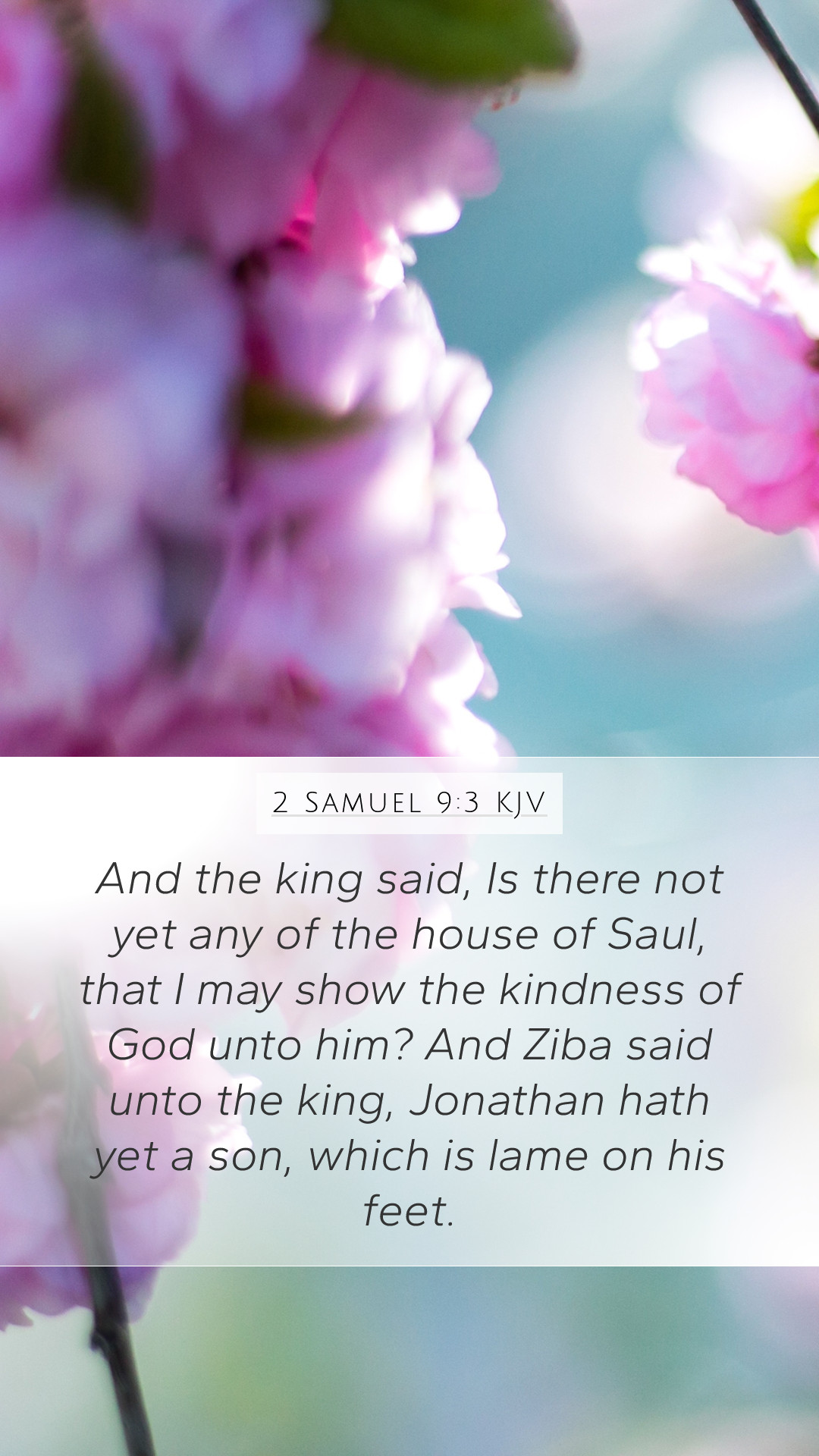Old Testament
Genesis Exodus Leviticus Numbers Deuteronomy Joshua Judges Ruth 1 Samuel 2 Samuel 1 Kings 2 Kings 1 Chronicles 2 Chronicles Ezra Nehemiah Esther Job Psalms Proverbs Ecclesiastes Song of Solomon Isaiah Jeremiah Lamentations Ezekiel Daniel Hosea Joel Amos Obadiah Jonah Micah Nahum Habakkuk Zephaniah Haggai Zechariah Malachi2 Samuel 9:3 Meaning
What is the meaning of 2 Samuel 9:3?
And the king said, Is there not yet any of the house of Saul, that I may show the kindness of God unto him? And Ziba said unto the king, Jonathan hath yet a son, which is lame on his feet.
2 Samuel 9:3 Bible Verse Meaning
Understanding 2 Samuel 9:3
The verse 2 Samuel 9:3 states: "And the king said, Is there not yet any of the house of Saul, that I may show the kindness of God unto him?" This verse manifests the themes of kindness, grace, and the fulfillment of promises. Below we provide an extensive analysis of its meaning and context through the insights of various public domain commentaries.
Bible Verse Meanings
- Divine Kindness: King David is exemplifying God's character through his desire to show kindness, reflecting God's promise to David about showing mercy to Saul's descendants.
- Grace in Action: This moment is pivotal as it represents grace extended to Mephibosheth, a descendant of Saul, who might not expect such kindness due to his family’s past enmity with David.
Bible Verse Interpretations
- Matthew Henry's Commentary: Henry notes that David's inquiry about Saul's house is driven by a sense of duty to fulfill the covenant made with Jonathan, Saul’s son. It shows the depth of David’s loyalty and love.
- Albert Barnes' Commentary: Barnes emphasizes that David's kindness is a means of showcasing God's love and mercy toward those whom society might overlook. David’s action stands as a testament to the nature of true friendship.
- Adam Clarke's Commentary: Clarke highlights that David went beyond mere blood relations to display kindness, symbolizing God's unconditional love and mercy that He extends toward all humanity.
Bible Verse Understanding
This verse encapsulates a vital moment in David's reign. It reflects his capacity to remember and honor his friendship with Jonathan even in light of the political tensions that existed due to Saul's former animosity towards him.
David's question reveals his willingness to offer grace where it might not be expected or deserved, portraying a significant biblical principle—God’s grace abounds to those who are seemingly undeserving.
Bible Verse Explanations
David’s inquiry serves as a powerful reminder for believers today about the importance of fostering relationships built on love and kindness. His actions set the stage for how we should approach our interactions—with grace, empathy, and a readiness to help others, regardless of their past or social standing.
Scripture Analysis and Biblical Exegesis
The historical context of this scripture indicates a time of consolidation of David's rule after a period of conflict. It highlights the transformative power of covenant relationships in the biblical narrative, where David’s kindness toward Mephibosheth serves as an example for understanding our obligations to one another, particularly through the lenses of loyalty and love.
Application of 2 Samuel 9:3
As individuals seeking to apply the insights from 2 Samuel 9:3, it is beneficial to reflect on our responsibilities to extend kindness, engage in reconciliation, and honor the promises we make to others, regardless of their background or previous relationships with us.
Practically, this can mean reaching out to those who may feel marginalized or forgotten by society, embodying the grace that God has shown us in our lives.
Cross References
- 1 Samuel 20:14-15: This passage establishes the covenant between David and Jonathan, highlighting the significance of loyalty and the promises made to one another.
- 2 Samuel 4:4: This verse introduces Mephibosheth and his situation, setting the stage for David's later acts of kindness.
- Luke 16:9: Jesus teaches about using worldly wealth to gain friends for eternal purposes, resonating with David's intent in showcasing kindness.


